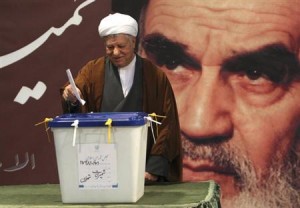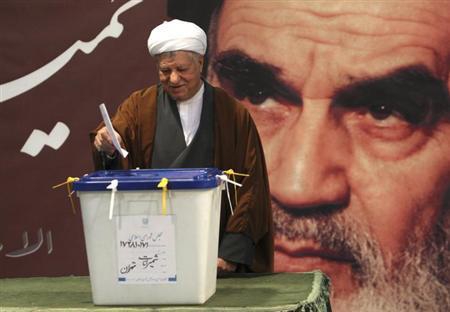 Former Iranian President Akbar Hashemi Rafsanjani casts his ballot in a parliamentary election in Tehran March 2, 2012.[/caption]
Former Iranian President Akbar Hashemi Rafsanjani casts his ballot in a parliamentary election in Tehran March 2, 2012.[/caption](Reuters) - Iran's best known political grandee, former President Akbar Hashemi Rafsanjani, looms large in the history of the Islamic Republic - now registered to run in Iran's presidential election next month he may also get the chance to carve out its future.
Few have wielded such influence in modern�Iran�as the 78-year-old but since 2009 he and his family have faced political isolation over their support for the opposition movement which lost the disputed election to President Mahmoud Ahmadinejad.
Ahmadinejad prevailed thanks to the unwavering support of Iran's most powerful authority, Ayatollah Ali Khamenei, a move that left gaping divisions in the religious and political elite.
Four years on and the leader is under pressure from political divisions at home and sanctions over Iran's nuclear program which are biting deep into the�economy�and Rafsanjani's practical outlook may be the tonic Iran now needs.
"Rafsanjani is above all a pragmatist, a problem solver. He looks for ways to get things done," said Shaul Bakhash, of George Mason University in Virginia.
"As president, if Khamenei allows him, I think he would move quickly to hold direct negotiations with the U.S., zero in on getting sanctions lifted, considerably moderate Iran's foreign policy rhetoric and take steps to create conditions for foreign investment," said Bakhash.
Rafsanjani radically alters what was previously seen as a contest between rival conservative groups. He could scupper the hopes of 'Principlists' - those fiercely loyal to Khamenei who want to secure a quick victory and present unity.
Significantly, Rafsanjani may be able to draw on the support of reformist groups which have been sidelined since 2009. "The Principlists will be in serious difficulty because of Rafsanjani. He'll also be representing the reformist camp," said Sadeq Zibakalam, a professor at Tehran University.
LAST MINUTE DEAL?
Earlier this week, Rafsanjani said he would not enter the field without Khamenei's consent over concern such a move would lead to conflicts and disputes.
Analysts say a last minute agreement with the supreme leader may have opened the way for his registration.
There have been signs though that the way was being cleared over the last year. Rafsanjani played a central role in hosting of the Non-Aligned Movement in Tehran last August and some see this as evidence of a deal in the offing. He was also pictured alongside Khamenei and U.N. Secretary General Ban Ki-Moon.
But some say his candidacy may be weaker than it appears.
"What we do not know is whether he still has the stomach for a fight, given his age, the life of ease he has led in the last decade, and the love of wealth he has developed," said Bakhash.
On hearing the name Rafsanjani, many Iranians immediately think of the vast fortunes he has amassed.
Eight years ago, Rafsanjani lost the election to Ahmadinejad, the little known mayor of Tehran at the time, a defeat that echoed the resentment of Rafsanjani as part of the elite and of serving few interests other than this own.
But his past may now get overlooked. "Eight years ago, I didn't vote for Rafsanjani because I thought he only cared for the wealthy, but now I will vote for him," said Moradi, an Iranian in his 60s who sells curtains in Tehran.
Above all, Rafsanjani is remembered for persuading the ailing founder of the Islamic Republic - Ayatollah Ruhollah Khomeini - to accept a peace deal after eight brutal years of war with�Iraq�and save Iran from imminent collapse.
Within a year, Khomeini was dead. In a move orchestrated by Rafsanjani, the Assembly of Experts - the state body tasked with choosing Iran's leader - appointed then president Khamenei.
But the rivalry between the two goes back 50 years to before Iran's revolution and is marked by vastly contrasting outlooks. Rafsanjani believed reform was the key to an enduring Islamic state while Khamenei feared it could hasten its demise.
Observers say Rafsanjani may have been out of the picture for the last four years but has not given up.
"Even though he has conflicts (with Khamenei) Rafsanjani will not leave power. He has a spirit which keeps him there ... this is a spirit which I think only he has," said Mohammad Hossein Ziya, the editor of a reformist news website.
PRAGMATIST
Rafsanjani has been described as "a pillar of the revolution" but his well-documented pragmatic policies - economic liberalization, better relations with the West and empowering Iran's elected bodies - appeals to many Iranians.
Rafsanjani is also a harsh critic of Ahmadinejad. When protests erupted on the streets of Iran in June 2009, there was little surprise about his sympathy for opposition supporters.
In what was his last sermon at Friday prayers in Tehran a month later, he incurred the wrath of hardliners by declaring the country was in crisis and calling for the immediate release of political prisoners and freedom of the press.
Step by step, Khamenei moved against Rafsanjani. Last year he was stripped of his powerful post at the head of the Assembly of Experts, a key state institution he had chaired since 2007.
The leadership has also put pressure on the 78-year old through the arrest of Rafsjanjani's daughter Faezeh. Found guilty of "anti-government propaganda" after openly backing the opposition in 2009, she was jailed for six months.
The following day, Rafsanjani's son Mehdi was imprisoned when he returned to Iran after an absence of three years.
Nevertheless, Rafsanjani is a skilled behind-the-scenes operator in the labyrinthine world of Iranian politics and may have a final chance at transforming the system he helped build.
Even then, progress will be slow. "There would be fewer own goals. He would get a better team than Ahmadinejad has had to run things," said Richard Dalton, British ambassador to Iran from 2003 to 2006.
"Financial management would be better - but the structural problems of the Iranian�economy�would remain."
By Reuters
The Iran Project is not responsible for the content of quoted articles.











